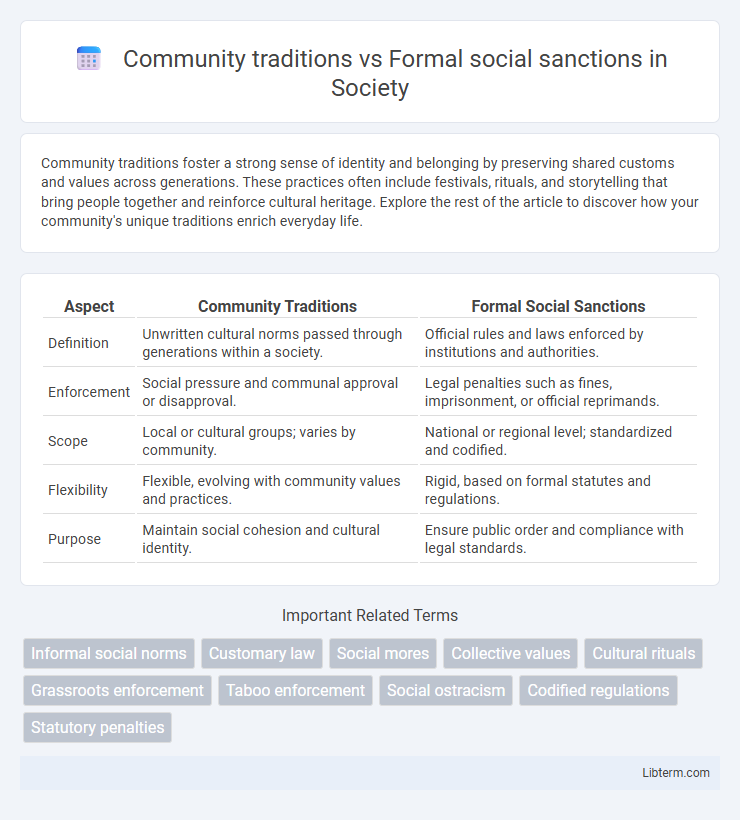Community traditions foster a strong sense of identity and belonging by preserving shared customs and values across generations. These practices often include festivals, rituals, and storytelling that bring people together and reinforce cultural heritage. Explore the rest of the article to discover how your community's unique traditions enrich everyday life.
Table of Comparison
| Aspect | Community Traditions | Formal Social Sanctions |
|---|---|---|
| Definition | Unwritten cultural norms passed through generations within a society. | Official rules and laws enforced by institutions and authorities. |
| Enforcement | Social pressure and communal approval or disapproval. | Legal penalties such as fines, imprisonment, or official reprimands. |
| Scope | Local or cultural groups; varies by community. | National or regional level; standardized and codified. |
| Flexibility | Flexible, evolving with community values and practices. | Rigid, based on formal statutes and regulations. |
| Purpose | Maintain social cohesion and cultural identity. | Ensure public order and compliance with legal standards. |
Introduction to Community Traditions and Formal Social Sanctions
Community traditions are culturally ingrained practices and norms that regulate behavior through shared values and collective memory, fostering social harmony and identity. Formal social sanctions are officially codified rules and legal penalties imposed by institutions to enforce conformity and deter deviance. Understanding the interplay between these informal customs and formal regulations reveals how societies maintain order and cultural continuity.
Defining Community Traditions: Roots and Relevance
Community traditions are deeply embedded practices and rituals originating from shared history and cultural values that shape group identity and cohesion. These traditions serve as informal social norms, guiding behavior through collective memory rather than codified laws or formal authorities. Their relevance lies in preserving cultural heritage, fostering social solidarity, and providing a framework for ethical conduct distinct from formal social sanctions imposed by legal or institutional systems.
Formal Social Sanctions: Law, Policy, and Enforcement
Formal social sanctions encompass law, policy, and enforcement mechanisms designed to regulate behavior within a society through codified rules and legal frameworks. Laws establish clear guidelines and consequences, while policies operationalize these frameworks in institutions, ensuring consistency and fairness in application. Enforcement agencies play a critical role in monitoring compliance, investigating violations, and imposing penalties, thereby maintaining social order and deterring misconduct.
Social Cohesion: The Role of Traditions in Community Harmony
Community traditions serve as vital mechanisms for fostering social cohesion by reinforcing shared values and cultural identity, which formal social sanctions may not fully capture. These traditions create informal norms and mutual expectations that encourage cooperation and conflict resolution within groups, enhancing community harmony. Unlike formal sanctions that are externally imposed and often punitive, traditions promote voluntary adherence and emotional bonds, strengthening social solidarity.
Authority and Control: How Formal Sanctions Shape Behavior
Formal social sanctions exert authority by enforcing codified rules and legal frameworks, shaping behavior through explicit consequences such as fines, imprisonment, or social exclusion. Unlike community traditions that rely on informal social norms and peer pressure, formal sanctions provide a structured system of control that ensures consistent application and deterrence across diverse populations. This institutionalized authority reinforces compliance, maintains social order, and curtails deviant behavior more effectively through legally backed mechanisms.
Conflicts and Synergies between Traditions and Formal Rules
Community traditions often embody informal norms that guide behavior through shared values and collective memory, creating social cohesion and enforcement mechanisms based on mutual respect. Formal social sanctions, codified in laws and regulations, impose standardized penalties for rule violations, ensuring broader societal order and legal accountability. Conflicts arise when traditions contradict formal rules, leading to challenges in law enforcement, while synergies emerge when legal frameworks integrate cultural practices, enhancing legitimacy and compliance.
Impact on Individual and Collective Identity
Community traditions shape individual and collective identity by fostering a sense of belonging and cultural continuity through shared rituals and values. Formal social sanctions enforce societal norms, reinforcing group cohesion and deterring deviant behaviors by establishing clear consequences. The interplay between these mechanisms influences how individuals internalize roles and responsibilities within their social groups, balancing personal freedom with collective expectations.
Real-World Examples: Community Traditions vs Legal Sanctions
Community traditions such as indigenous practices in the Amazon preserve social order through customs like conflict resolution ceremonies, contrasting with formal legal sanctions enforced by national courts in cases of environmental violations. In Japan, neighborhood associations use peer pressure and mutual aid as informal social sanctions to promote harmony, differing from the formal penal system that handles criminal offenses. These examples highlight how community-based norms often emphasize restorative justice, while formal social sanctions prioritize deterrence and punishment.
Cultural Adaptation and the Evolution of Social Norms
Community traditions play a crucial role in cultural adaptation by preserving collective identities and reinforcing long-standing social practices that evolve organically within groups. Formal social sanctions, enforced by institutions or legal systems, regulate behavior through codified rules, promoting social order but often lagging behind rapid cultural shifts. The dynamic interplay between these informal traditions and formal sanctions drives the evolution of social norms, facilitating the continuous adaptation of cultures to changing environments and societal values.
Balancing Traditions and Formal Sanctions in Modern Societies
Balancing community traditions and formal social sanctions in modern societies requires integrating cultural values with legal frameworks to maintain social cohesion and respect diverse identities. Community traditions often provide informal mechanisms of social control rooted in historical and cultural contexts, while formal sanctions enforce laws designed to uphold public order and protect individual rights. Effective governance involves harmonizing these systems, ensuring that traditional practices do not conflict with legal standards and that formal sanctions acknowledge and accommodate cultural norms.
Community traditions Infographic

 libterm.com
libterm.com